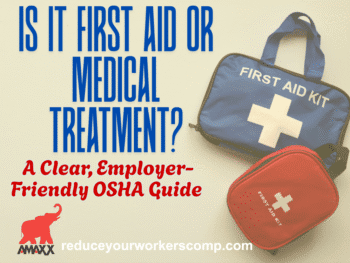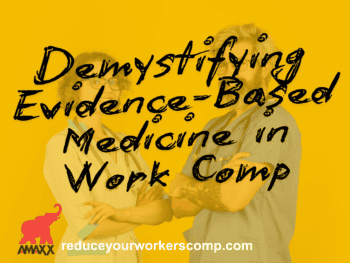
Burden of Proof in Work Comp
In most instances, the injured employee carries the burden of proof regarding a workers’ compensation claim. While this may seem like a significant challenge, the statutory framework is often geared toward giving the employee the edge as, ultimately the question is whether the work accident or activity was a “substantial contributing factor” in the onset or progression of the condition. This standard is significantly lower than the burden in criminal cases – beyond a reasonable doubt, and even lower than most civil standards – “clear and convincing evidence” or a ”preponderance of the evidence” standards.
Click Link to Access Free PDF Download
“The 6-Step Process To Determine Workers’ Comp Injury Causation”
Based on this lower legal threshold, there are many questions a claim handler must ask when making initial decisions regarding medical causation:
- Does the claimed mechanism of injury sound like it would reasonably result in the injury;
- Was the injury witnessed, and if not, whether there are significant credibility issues in statements made by the employee; and
- Whether the medical evidence based on the employee’s first treatment raises red flags.
Claim handlers should never deny claims based on animosity, spite, or gut feelings. Always make reasonable decisions based on the facts in the evidence uncovered in the investigation.
Dealing with Issues of Aggravations and Exacerbations
Work activities aggravating or accelerating an underlying condition are also generally compensable in workers’ compensation. Even if there is a well-documented medical condition, work activities that progress or change for the worse the employee’s condition or functional ability should be admitted.
There are many factors to consider when reviewing medical evidence to make correct determinations and accepting primary liability:
- Changes in the frequency of the employee’s need for medical care;
- Notations in medical records that document care associated with work activities;
- An increase in functional limitations or restrictions imposed on an employee; or
- Documented progression or change in the level of pain complaints or symptomology.
It is vital to obtain authorizations and promptly obtain as many medical records as possible at the onset of a claim. Many workers’ compensation statutes provide a “grace period” where payment can be made for medical care while an investigation is ongoing. This allows claim handlers to make payments without locking their insured position on a claim. Use these tools if available, as it also buys goodwill with the employee.
Medical Causation in Workplace Exposure Claims
Experienced members of the claim management team are generally assigned more complex claims that involve workplace exposure to chemicals or substances. When working on these claims, it is vital to ask the following questions:
- Review evidence of the disease; does it exist?
- Review clinical evidence of a causal relationship; do studies support a link?
- Examine evidence of exposure; highest quality evidence is quantified personal measurements of tasks of the worker; lowest quality is job title or self-report of exposure.
- Consider other relevant factors, such as comorbidities, prior injuries, etc.
- Judge the validity of the testimony; is the injured worker telling the truth?
- Make the causation determination.
Another critical determination that needs to be made is whether the employee would have been able to come into contact with the chemicals in question. Reviewing the employee’s job descriptions and interviews with their supervisors can help clarify the facts surrounding the alleged exposure. Claim handlers can also enlist the assistance of a medical director or other experts to assist with these determinations.
Conclusions
Issues of medical causation are one of the first important decisions made on a claim. Making decisions requires understanding the burden of proof and issues considering the nature and extent of an injury. More complex issues require specific steps and can include the assistance of medical experts. Making the correct decision can drive better results and efficiencies within a claim team. It can also help reduce workers’ compensation program costs.

Contact: mstack@reduceyourworkerscomp.com.
Workers’ Comp Roundup Blog: http://blog.reduceyourworkerscomp.com/
©2023 Amaxx LLC. All rights reserved under International Copyright Law.
Do not use this information without independent verification. All state laws vary. You should consult with your insurance broker, attorney, or qualified professional.


























